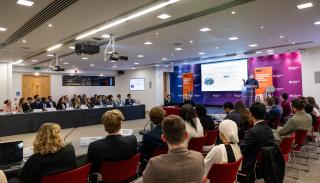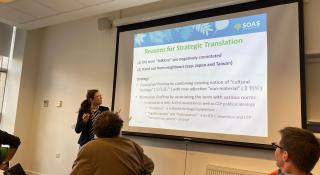
Breadcrumbs navigation
Fourth annual climate negotiation simulation takes place in partnership with Chatham House
On Monday 9 December, the fourth annual BISA climate negotiation simulation took place at Chatham House in London. 60 students from 30 universities took part, alongside six participants from Chatham House’s Common Futures Conversations, part of The Queen Elizabeth II Academy for Leadership and the Next Generation. The aim of the event was to engage students in a topical and important issue, and to raise their awareness of the international politics of climate change.
The day commenced with a keynote speech by Ruth Townend, Senior Research Fellow at Chatham House’s Environment and Society Centre. Ruth's work at Chatham House focuses primarily on climate risk and diplomacy, exploring the interplay of climate change, international affairs and national and local politics. Ruth leads Chatham House’s climate diplomacy work and hosts the Climate Briefing podcast. She is currently working in collaboration with the Russia and Eurasia Programme to develop insights into the challenges and opportunities of Azerbaijan’s climate leadership role around COP29, and as part of the Troika with COP28 host the UAE, and COP30 host Brazil.
Following the keynote, negotiations began. The climate negotiation is modelled on a simulation designed by Professor Mark Webber (University of Birmingham), and reproduces the negotiations held under the auspices of the United Nations. Students represented one of the ‘parties’ (i.e. states) that have signed up to current international agreements on climate change (such as the Paris Agreement of 2015 and the Glasgow Climate Pact of 2021). The simulation was geared toward refining these previous agreements, and achieving reductions in global greenhouse gas emissions, generating a fund to finance climate transition, and agreeing on a statement of principles.
By the middle of the day, several propositions were open for debate, with a particularly lively Russian delegation calling for support for a joint Saudi-Chinese proposition.
Abigail Barwick, a student from Leeds Beckett University, and part of the team who won the 'Distinguished Delegation' award, said:
“It was great to connect with like-minded individuals interested in solving the key problems of our time. I feel that I have developed confidence in speaking in formal settings and that I have become more skilled in debating and thinking on my feet in tense situations.”
Proceedings were brought to a close with a keynote speech from David Gunn, also Senior Research Fellow at Chatham House’s Environment and Society Centre, and lead for the Sustainability Accelerator in the Environment and Society Centre. David is a strategist with extensive experience across commercial, creative and third sectors, with specialist skills in the convening and facilitation of complex groups and the design of large-scale processes of participation and innovation.
At the end of the day, awards were presented for Distinguished and Outstanding delegations, alongside an award for embodying the role. The awards went to:
- Distinguished delegation award: Abigail Barwick and Sarata Sawo (Leeds Beckett)
- Outstanding delegation award: Nadine Guerfi and Angelica Reyes Caceres (University of Bath)
- Embodying the role award: Leo Taylor and Feni Patel (University of Aston)
All participants will receive a certificate to commemorate their involvement.
We are extremely grateful to Chatham House for partnering with us on this year’s climate negotiation simulation, to Professor Mark Webber for taking the lead on the academic arrangements once again, and to Dominic Hart the BISA Virtual Conference Intern for acting as Vice-Chair for the event.


